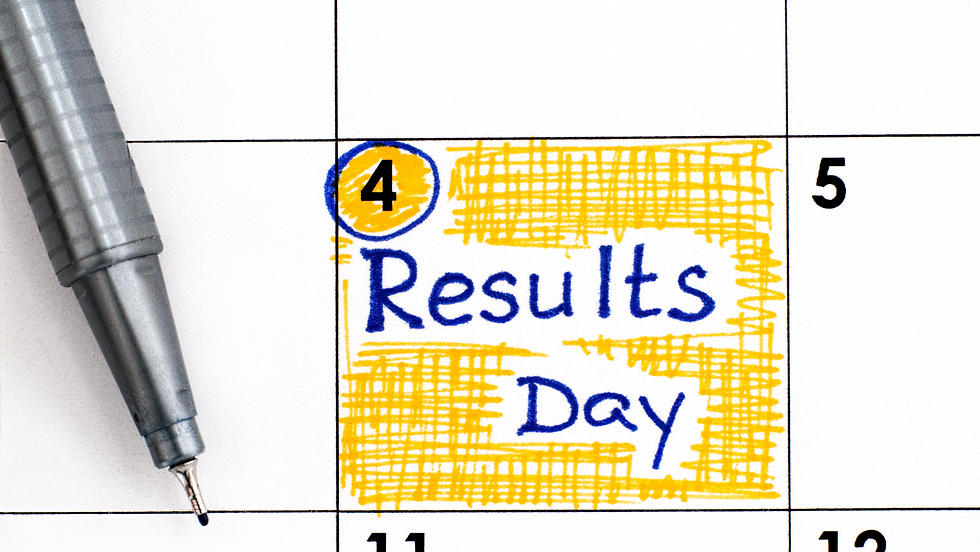How To Survive Results Day
- Titanium Tutors
- Aug 17, 2023
- 8 min read
There is so much build up to results day, whether it’s GCSEs or A-Levels, and it’s only natural to feel apprehensive; a lot of time and effort has gone into these grades, or you may be worried that not enough time and effort went into them!

Anticipation, anxiety, excitement, fear; there are a whole range of understandable emotions experienced by students and sometimes a whole mixture of them! It can be overwhelming but we’re by your side every step of the way.
How to Stay Cool and Calm
You know yourself best; if you find it comforting sharing any worries with friends who are all playing the same waiting game leading up to Results Day, go ahead and make plans with them! If you know that, as much as you love your pals, that you will probably all feed off each other’s nervous energy and you will end up feeling more stressed, then step back and have some time with your family.
Keep occupied; if your anxious thoughts have a habit of spiraling, the best way to nip it in the bud is to engage your mind in activities. What needs cleaning or sorting? What books have you been meaning to read? What films are still on your to-watch list? Go for a bike ride or a walk with friends or family. Do the biggest jigsaw puzzle you can find!
Similarly, if you think in the lead up to Results Day or on the day itself that you will be tempted to compare yourself to others or will feel pressured into sharing your results, pause your notifications and take a break from social media for anything from a few hours to the whole week.
Take care of yourself. Staying hydrated, eating regular nutritious meals and getting enough sleep will get you in the best state to handle any external pressures and stresses. Getting some exercise, spending time outdoors, practicing yoga and meditating are all proven ways to lower the body's stress response and boost the release of the feel-good chemicals like dopamine and serotonin.
Talk to friends and family members who have their own Results Day stories. It’s grounding and comforting that this is just a day that we all experience and one day you’ll be reassuring someone younger with your own Results Day memories!

Results Day Arrives - What You Need to Know
Ensure you know what time your school or college will be allowing students to come in to collect results - don’t rely on hearsay from friends or siblings as, since 2020, schools and colleges have had to take various approaches to releasing results including emailing them or having a staggered schedule. Make sure you take responsibility for how you will receive your results so you eliminate any unnecessary surprises and can keep your cool.
Whatever exam results you will be receiving, make sure you log on to UCAS (if you applied through UCAS), or your email, or open that envelope in circumstances where you feel most comfortable. Whether you would like to take a moment to quietly look at your results on your own, or you want your parents sat next to the laptop with you, be sure you are choosing whatever option avoids any unnecessary stress and makes the moment as enjoyable as possible for you. You could even open the envelope on the count of three at the same time as your friends!
If you need to contact UCAS, it is you they will need to speak to. If someone else, like a parent, guardian or other relative will be picking up your results on your behalf, make sure you have informed UCAS ahead of time that you are giving this person nominated access to speak on your behalf. If you haven’t done this, UCAS will not be able to speak to them about your application details.
You are going to receive statements of results - these are not your actual certificates. Your school or college will be in touch with you regarding when and how you will receive your official certificates; they may even have a presentation evening organised! While you can use these statements of results as proof of qualifications in the interim period between results day and receiving your certificates, you will need these certificates in future so do be aware of when to expect them (usually the autumn!).
What Should I Bring?
A fully charged mobile phone
Notes with your UCAS number, the courses you’ve applied to and their requirements. Specific points about accommodation and why you liked them can also be helpful to note in brief bullet points. It may also be handy, just in case, to have your GCSE results written down in case you need to go through Clearing and this comes up.
Something to make notes on. If you need to make calls to UCAS or have some discussions with your teachers, there will be lots of important details or possibly other phone numbers of specific universities that you will need to write somewhere.
A bottle of water. Whether it’s excitement, talking a lot or nerves, you mind find yourself in need of some refreshment!

What If I Don’t Get the Results I Need?
Firstly, A Level students should check the UCAS Hub. You may still be accepted even with lower grades so don’t jump to any conclusions and keep a cool, clear head.
Whether you are a GCSE or A Level student, it’s important to remember that many students, every year, do not get the results they were hoping for and expecting but they still go on to pursue exciting courses at university or college. Sometimes this will lead you to a path you would have never otherwise considered or it could simply mean a few much smaller concessions.
Either way, please keep in mind that dreams do not end on results day. You are so very early in your educational journey and there are so many people and organisations at the ready to help you which we will add at the bottom of this blog! (Information correct as of August 2023).
Make a Plan B
You will save yourself a lot of stress on the day if you prepare ahead of time.
If you are an A Level student, it’s natural to be reluctant to entertain the possibility that you may not get what you need to pursue your Plan A, but the vast majority of students have conditional offers.
If you are a GCSE student, the Sixth Form college will have required grades for the A-Level, BTEC or T-Level courses you want. The advice is the same: prepare your back up plan before results day. What other courses (at uni or college) would you be interested in? Make a note of courses asking for requirements a little lower that your first choice so if it came to it, you would have back-ups in mind that you have researched and decided on while the adrenaline isn’t rushing through you on results day.
What is Clearing and How Does It Work? [A Level Students only]
UCAS Clearing is for students in a range of situations but it is predominantly used by students who haven't secured the entry grades they needed for their firm and insurance offers and have had these offers withdrawn. Did you know that students don't have to wait until results day to use Clearing - even prior to results day, students who didn't get any offers when they first applied or who applied after the end of June are already using Clearing!
If your offers have been withdrawn, you will see a Clearing number when you log in to UCAS. Make a note of this. You have time - Clearing offers cannot be accepted until 1pm on results day so don't imagine all the places are "flying off the shelves"!
This is where your Plan B preparation comes into play. It’s time to call the universities where you might like to study instead. The staff on the other end of the phone will be experienced and understanding but make sure you are prepared when you phone. Take a sip of that water (didn’t I tell you it would come in handy?), take a deep breath and make sure you have those notes in front of you. The phone call may be very quick and simply involve you giving your grades and checking if there is availability on the course you would like. Equally, it could be more interview-like in tone so have some answers at the ready as to why this is the best choice for you and why you would be well-suited to studying there. Think through why you are interested in the subject, why you may have missed out on the grade. These are things you can prepare for ahead of results day. Look at the person you presented yourself as in your Personal Statement and channel that composed, best version of yourself for the phone call.
It’s also important to remember that phone lines are going to be busy - be patient but also weigh up your options. You may have more luck with one of your other choices in the meantime!
You can use Clearing if you find yourself in any of the following situations:
You don't want any of the places you've been offered
You’ve changed your mind about where you want to go and/or what you want to study
You have received better grades than predicted may and want to explore other options you had thought wouldn’t be available to you.
In these situations, you would be able to "self-release" from your offers and use Clearing instead. This is something you must think very carefully about - discuss this with your teachers and parents or guardians as well as with the experts working for UCAS Clearing; giving up your existing university place means it can be taken by another student. It also means you’ll have to update your student finance application and reapply for accommodation. Make sure you know exactly what the risks and benefits of “self-release” will be in your circumstances and don’t make any impulsive decisions.
Requesting a Remark
If you think there has been a mistake in your grade, you have the right to appeal against the grade you have received. The first sign that this could be the case is if there is a discrepancy between your grade and those you received in your mocks and practice papers. Speak to your subject tutor first as they will be best placed to advise you and will help in the process of contacting the exam board to request to see the marked paper. It can then be determined whether or not it would be worth requesting the mark to be reviewed. Be aware that there is a cost for remarking papers so research this first so you don’t get any surprises!

Things Every Results Day Student Needs to Remember
After two intense years of being prepped for your GCSEs or A-Levels, it’s hard to switch your mindset from “this is the most important thing” to “this isn’t the be-all and end-all” but try to keep perspective. Every choice you make now, feels quite understandably enormous and life-altering but in the bigger picture of your life, it may surprise you that one day you won’t actually remember much about the details of Results Day!
You have options, time and support. Everyone at your school or sixth form do this every year; so do the admissions departments and Clearing team. They are there to help and support you whatever the outcome.
Celebrate! However you choose to celebrate yourself; it might be a huge party or it might just be looking at yourself in the mirror and giving your reflection a grin. Just give yourself recognition for the journey you’ve been on and the one that’s about to start!
Helpful Contacts
Mind - For young people In addition to the above, Titanium Tutors are always here to help! Follow our revamped social media for weekly hints and tips, or get in touch to find a tutor to guide you through the transition from school to university - or whichever alternative suits you.

Blog Post Crafted by Jenny
Jenny is our Deputy Company Manager, co-managing our Admin Team.
She studied Theatre Studies at Rose Bruford College and got a First Class BA Hons from University of Manchester, before going on to teach Drama in schools.
She loves chilli con carne and a cup of tea, but not together, and is quite confident she could beat you at scrabble.

Comments